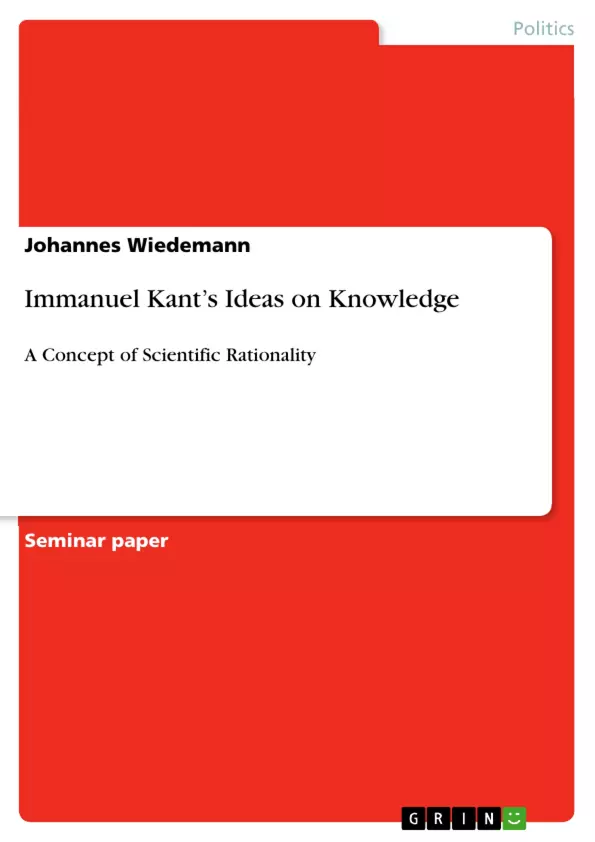If one explores the concept of scientific rationality as it was developed from Aristotle on over Thomas Aquinas to Ludwig Wittgenstein and beyond, one is surprised by the discovery that as all schools or approaches reflecting on knowledge, also the concept of scientific rationality is less a solid set of rules, but more a contested battleground of ideas. What are the conditions of scientific rationality? Is there scientific truth or certainty? Is there something or somebody beyond the boundaries of knowledge? What has Immanuel Kant in stock to contribute to answering these questions? That is the topic addressed in this paper: An outline of Kant‟s concept of knowledge and a deriving theory of science with a backcloth of recent contributions of contemporary scientists, representing the current situation in this discussion. Kant and his thoughts on that matter are not the least suitable for depiction by the fact that his work undertook the mission to sooth the antagonism
of rationalism and empiricism in his time which led not only to a synthesis, but to a re-assessment or even transformation of the respective theory as such.
Inhaltsverzeichnis (Table of Contents)
- Introduction
- 1. The Contested Concept of Scientific Rationality.
- 2. Kant's Concept of Knowledge .........
- 3. Kant's Concept of Science..
- Does the Beacon still shine? Conclusion on Kant as a Datum of Knowlegde.......
Zielsetzung und Themenschwerpunkte (Objectives and Key Themes)
This term paper aims to explore Immanuel Kant's concept of knowledge and its implications for a concept of scientific rationality. It examines the historical context of the contested notion of scientific rationality, outlining the debate between rationalism and empiricism and analyzing the contributions of various contemporary scholars.
- The contested nature of scientific rationality
- Kant's transcendental argument and its application to science
- The role of objectivity and truth in scientific knowledge
- The relationship between rationality and empirical data
- The ongoing debate on the validity of Kant's approach to knowledge in contemporary science
Zusammenfassung der Kapitel (Chapter Summaries)
- Introduction: This chapter introduces the topic of scientific rationality and its historical development, highlighting the ongoing debate and the need for a deeper understanding of its principles. The author emphasizes the relevance of Kant's work in this context, arguing that his ideas can provide valuable insights into the nature of knowledge and the conditions for scientific understanding.
- 1. The Contested Concept of Scientific Rationality: This chapter explores the diverse perspectives on scientific rationality from Aristotle to contemporary philosophers. It discusses the "Classical Model of Science" and its key postulates, highlighting the tension between rational and empirical approaches. The author introduces concepts such as "Prussian concept of rationality" and "English concept of rationality" to illustrate the contrasting views on the role of evidence and consistency in scientific reasoning. The chapter concludes by analyzing the challenges posed by historicist currents to the very notion of scientific rationality.
- 2. Kant's Concept of Knowledge: This chapter presents a brief introduction to Kant's transcendental argument from the Critique of Pure Reason. It focuses on outlining Kant's approach to knowledge, exploring the role of reason, experience, and the categories of understanding in shaping our perception of the world. This section provides a foundation for understanding how Kant's ideas can be applied to the study of science.
- 3. Kant's Concept of Science: This chapter examines the implications of Kant's theory of knowledge for a Kantian concept of science. It explores how Kant's approach can inform our understanding of scientific inquiry and the nature of scientific truth. This section analyzes the potential contributions of Kant's ideas to the ongoing debate on scientific rationality, focusing on the role of reason, experience, and objectivity in scientific understanding.
Schlüsselwörter (Keywords)
The main keywords and focus topics of this term paper include scientific rationality, Kant's theory of knowledge, transcendental argument, Critique of Pure Reason, objectivity, truth, evidence, consistency, empiricism, rationalism, historicism, postmodernism, science, philosophy of science, epistemology.
What is scientific rationality according to Immanuel Kant?
Kant views scientific rationality as a synthesis of reason and experience, where the mind provides the structure (categories) through which empirical data is processed to achieve objective knowledge.
How did Kant resolve the conflict between rationalism and empiricism?
Kant argued that "thoughts without content are empty, intuitions without concepts are blind," merging the rationalist focus on reason with the empiricist focus on sensory data.
What is the „transcendental argument“ in the Critique of Pure Reason?
It is Kant's method of investigating the conditions that make knowledge and experience possible in the first place, regardless of the specific content of that experience.
Is scientific truth certain in Kant's philosophy?
For Kant, scientific certainty is possible within the realm of "phenomena" (the world as we perceive it), though "noumena" (things-in-themselves) remain beyond the boundaries of human knowledge.
How relevant are Kant's ideas to contemporary science?
Kant's work remains a cornerstone in the philosophy of science, particularly in debates about objectivity, the role of evidence, and the limits of human understanding in modern physics and psychology.



